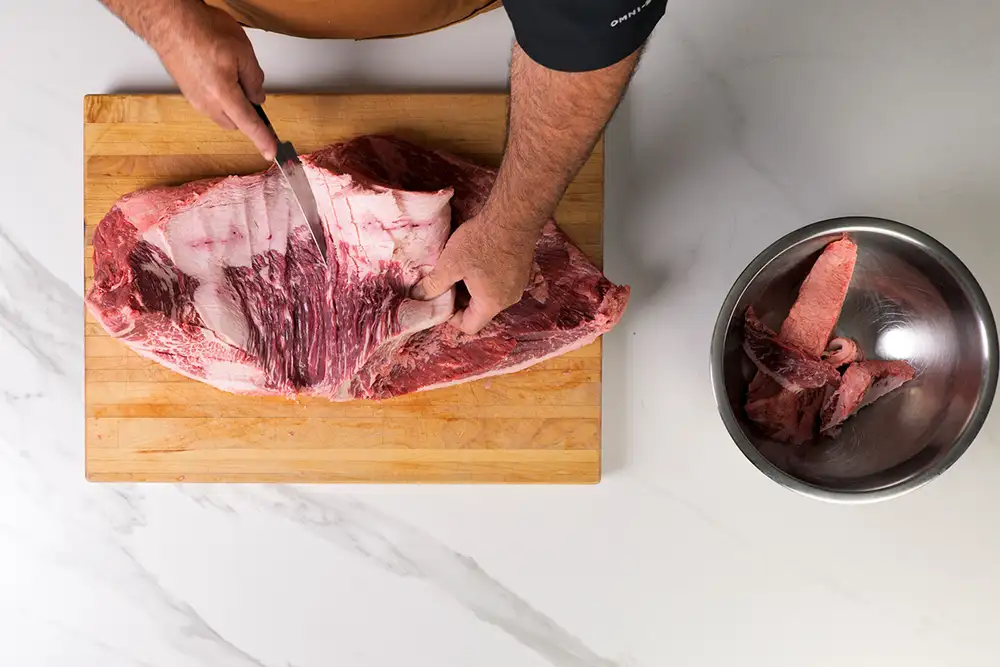
Newsletter Subscribe
Enter your email address below and subscribe to our newsletter

Enter your email address below and subscribe to our newsletter

As a professional chef, I have cooked many types of beef in my years of experience. However, none have puzzled me as much as Wagyu beef.
Why is Wagyu beef so expensive? Wagyu beef is expensive due to its rarity, labor-intensive rearing process, and distinctive marbling. The cattle are selectively bred, receive special feed, and are often massaged to enhance their fat muscle layers.
You may have heard that Wagyu cattle are raised differently or have higher fat levels.
But how does that justify the hefty price tag? Let’s dive deeper into the world of Wagyu beef and find out.
In This Article

Wagyu beef originally comes from Japan and refers to four different breeds of cattle: Japanese Black, Japanese Brown, Japanese Polled, and Japanese Shorthorn.
These breeds are genetically predisposed to producing beef with high levels of unsaturated fat, giving it a distinct taste and texture sought after by connoisseurs.
There are several key reasons why Wagyu beef is so expensive and worth remembering the next time you order one at your favorite steakhouse.
Wagyu cattle are raised specifically to ensure the highest quality beef possible.
They are often raised on specific farms and consume a diet consisting of high-quality grains and grasses.
Furthermore, raising Wagyu cattle is a lengthy process, and the cost is passed down to the consumer.
Wagyu beef is not as readily available as other types of beef, limiting the supply.
This leads to an increase in demand, which directly affects the price.
Furthermore, importing Wagyu beef from Japan to other parts of the world can be more expensive due to transportation costs and import taxes.
Wagyu beef has a higher level of monounsaturated fat compared to other beef types.
This fat is also distributed evenly throughout the meat, giving it a marbled appearance.
This even distribution of fat improves the taste and tenderness of the meat, but it also means there is less usable meat per animal, increasing the cost.
The price of wagyu beef can vary widely depending on the quality, cut, and vendor.
On average, you can expect to pay anywhere from $25 to $150 per pound for wagyu beef, with prices sometimes reaching as high as $200 per pound or more.
It’s also worth noting that some vendors may add additional charges for things like shipping, taxes, or handling.
This is a subjective question, but many would argue that Wagyu beef is worth the high price tag.
The intense marbling and distinctive flavor make it a sought-after delicacy, particularly among food enthusiasts.
However, whether or not it’s worth the price is ultimately up to individual consumers.
Wagyu beef can be purchased from many reputable vendors, both online and in person.
It’s important to do your research and only purchase from vendors that can certify the authenticity and quality of their products.
Some reputable vendors include Snake River Farms, Holy Grail Steak Co, and Debragga.
Kobe beef is often associated with Wagyu beef due to its popularity in the United States.
Kobe beef is a specific type of Wagyu beef that comes from the Tajima strain of Japanese Black cattle.
It is only produced in the Hyogo Prefecture of Japan and is highly regulated.
On the other hand, American Wagyu beef is produced in the United States and is a cross between Wagyu cattle and other breeds.
While American Wagyu beef is not the same as Kobe beef, it can still be pricey due to the same factors that affect Wagyu beef.
That is subjective and depends on your personal preferences. If you enjoy the taste and texture of Wagyu beef, then it may be worth the price for you.
Wagyu beef has a rich, buttery flavor due to the higher levels of unsaturated fat.
Yes, there are many alternatives to Wagyu beef that are more affordable, such as grass-fed beef or grain-fed beef. However, they may not have the same taste and texture as Wagyu beef.
Wagyu beef is expensive due to a combination of factors, including the cost of raising the cattle, the limited supply, and the high levels of fat.
However, the taste and texture of Wagyu beef make it a delicacy that many are willing to pay the premium price for.